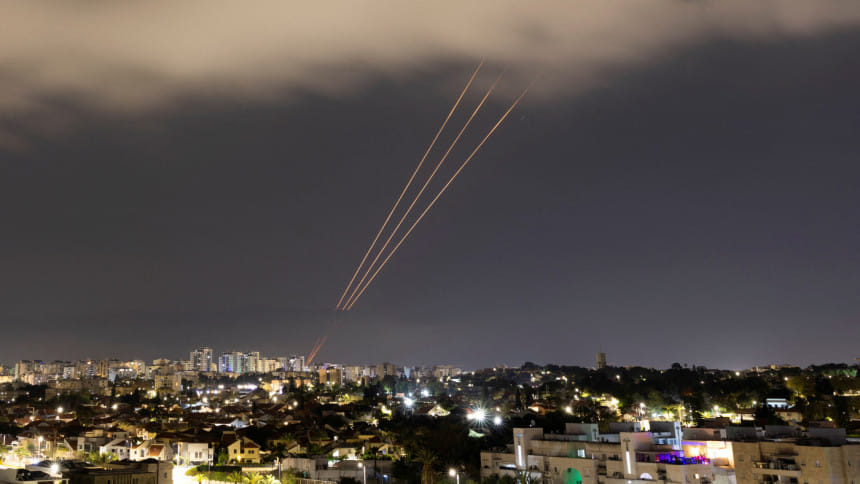Iran attacks: Israel may not act rashly

The prospect of a major regional war in the Middle East escalated today with Benjamin Netanyahu's war cabinet due to meet to decide Israel's response to Iran's drone and missile attack.
However, according to experts, early signs show that Israel is unlikely to respond rashly amid a call of restraint by most world powers.
Netanyahu's ministers voted in the middle of the night to delegate that decision to the tiny war cabinet, comprising Netanyahu, defence minister Yoav Gallant and Benny Gantz, a Netanyahu opponent who joined the government as minister without portfolio after the Hamas 7 October attack, which began the spiral of violence that has brought Israel and Iran to the brink of war.
These three prickly rivals will decide the next step, with the fate of the region now resting in their hands, reports The Guardian.
Israel will exact a price from Iran in response to its mass missile and drone attack when the time is right, centrist war cabinet minister Benny Gantz said on Sunday.
"We will build a regional coalition and exact the price from Iran in the fashion and timing that is right for us," Gantz said in a statement ahead of the meeting.
In the nervous hours leading up to the war cabinet meeting, Netanyahu and Biden spoke by phone for 25 minutes, during which, according to some reports in the Israeli media, the US president urged restraint.
Biden issued a statement minutes after the call in which he gave no explicit advice to Netanyahu but he noted that with US help, "nearly all of the incoming drones and missiles" had been brought down.
That "remarkable" defensive capacity, Biden argued, was by itself "a clear message to its foes that they cannot effectively threaten the security of Israel".
Biden also told Netanyahu that the United States would not participate in any Israeli counter-offensive against Iran, according to reports on Sunday by CNN and the Wall Street Journal.
Iran launched hundreds of drones and missiles at Israel on Saturday night in response to a suspected Israel attack on Iran's Syria consulate on April 1.
Biden suggested further response was unnecessary.
As of early Sunday morning, the only reported casualty from the aerial onslaught was a 10-year-old girl in Israel's southern desert, from the country's most marginalised community, the Bedouins. A southern military base was lightly damaged.
In the run-up to the expected Iranian assault, US officials had hypothesised just such an outcome: that Iranian projectiles would fall in the desert and not cause significant casualties. In that case, the officials predicted, Washington would urge strongly against a rash Israeli response.
Iran is clearly hoping for such a muted response. In a message delivered through its mission at the UN, Tehran suggested hopefully that in the wake of its retaliation: "The matter can be deemed concluded."
Both Biden and the Iranians are well aware that Netanyahu would ideally like to destroy Iran's nuclear facilities, which he has long seen as an existential threat to Israel. Reducing them to rubble would be very hard without US help, but it is possible that he and other Israeli hawks could try seize this opportunity to deliver that ambition.
NBC News reported on Saturday night that some top administration officials are "concerned Israel could do something quickly in response to Iran's attacks without thinking through potential fallout afterward".
The report said Biden had privately expressed concern that Netanyahu is "trying to drag the US more deeply into a broader conflict", citing three people familiar with the president's comments.
Administration officials are well aware that Netanyahu has an incentive to keep hostilities going, as it fends off the collapse of his coalition and new elections.
While the damage to Israel was minimal, Israeli officials could argue that was no thanks to Tehran, but to the reliability of Israeli air defence and its allies, most notably the US, the UK and Jordan. Jordan risked being lambasted in the Arab world for intercepting some of the Iranian drones as they crossed its airspace.
That joint action, prepared in the week before the Iranian attack, almost certainly saved lives and may have fended off a wider war. It could also serve as a reminder of Israel's dependence on the US to keep Israelis safe.
In the short term, Washington can draw comfort from a few signs any Israeli response will not at least be immediate. Israel has called for a UN security council session on the attack, which will happen at 4:00pm New York time on Sunday. It would be surprising if a counter-attack was launched before that session.
Another possible sign that the response could be muted was Gallant's conversation with his US counterpart, Lloyd Austin, after the attacks. According to the Israeli defence ministry, Gallant "emphasised that the defence establishment is prepared for any further attempts to attack the state of Israel". His comments made no mention of Israel striking back.
A third positive sign in the early hours of Sunday was a reassurance from an Israeli official cited by the New York Times that "Israel's response would be coordinated with its allies".
Washington is likely to remind Israel in the coming hours and days of its gains from having withstood Iran's fury, largely unscathed.
The attack has for now distracted global attention from Israel's conduct of the war in Gaza. Furthermore, the Iranian attack is also likely to dispel murmurs in the US Congress about curbing weapons supplies to Israel because of Gaza. Now such restrictions can be cast by Israel's supporters as leaving America's leading ally in the Middle East defenceless in the face of the proven Iranian threat.

 For all latest news, follow The Daily Star's Google News channel.
For all latest news, follow The Daily Star's Google News channel. 



Comments